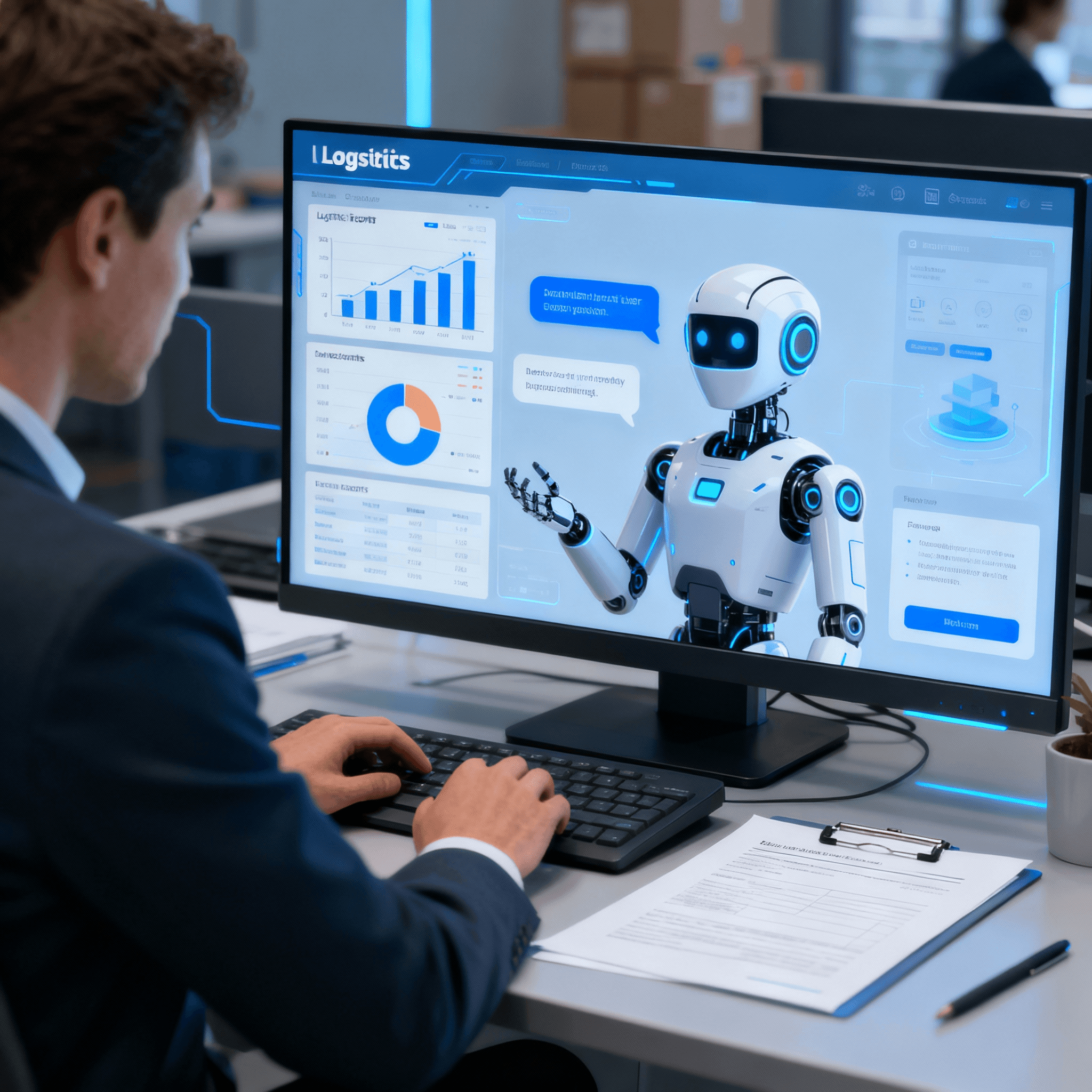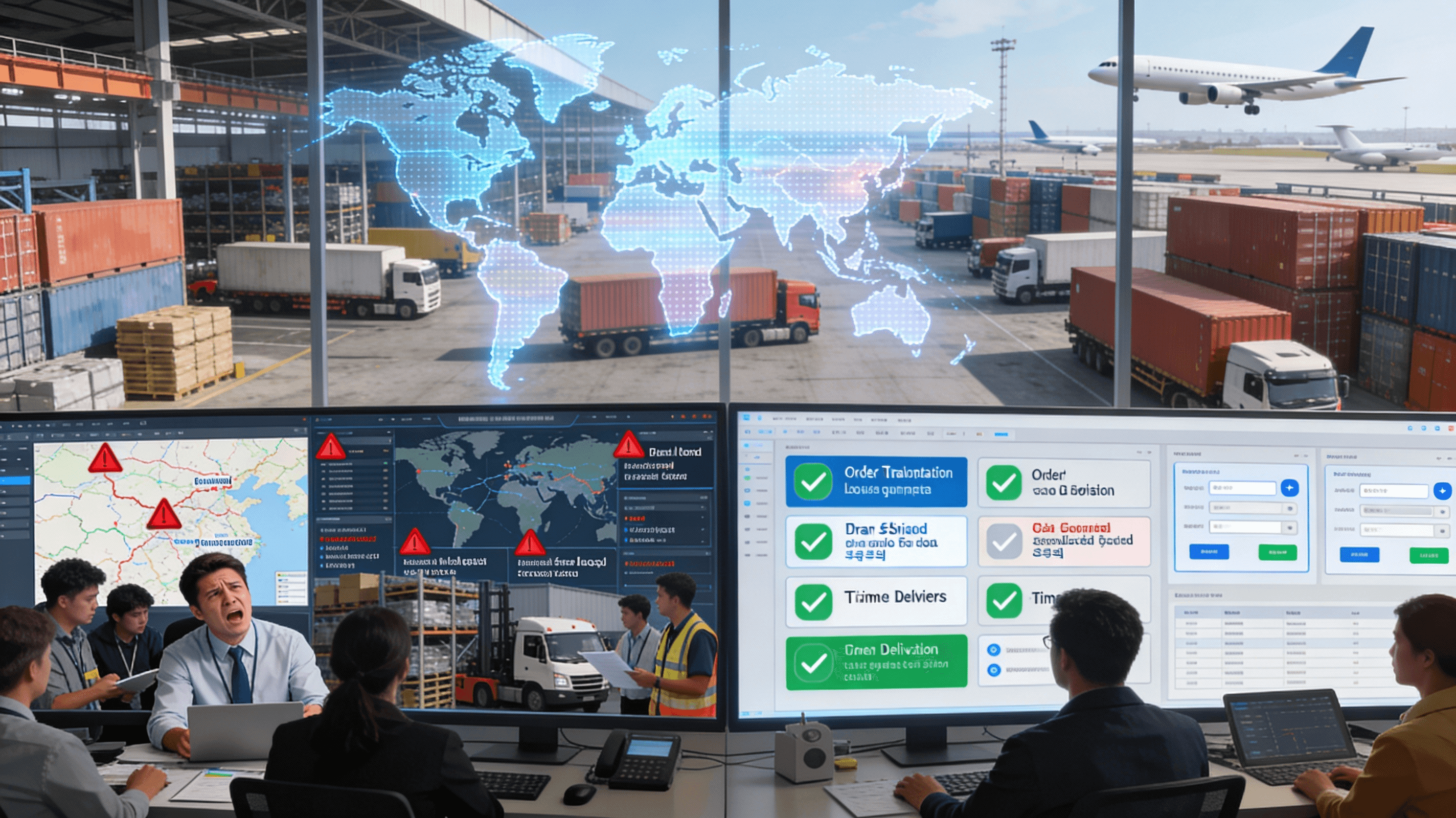Can Generative AI Create Logistics Reports and Handle Customer Service?
Thursday, 2 Oct 2025
|
Can Generative AI Create Logistics Reports and Handle Customer Service Inquiries?
Creating logistics reports manually—consolidating data from multiple systems, analyzing trends, generating insights, formatting presentations—consumes dozens of hours weekly across most organizations. Simultaneously, customer service teams field thousands of repetitive inquiries about shipment status, delivery times, documentation, and billing that tie up skilled personnel answering questions AI could resolve in seconds.
Traditional approaches trap logistics operations in a productivity paradox: teams spend more time reporting on work than doing strategic work, while customers wait hours or days for responses to routine questions that algorithms could answer instantly. The global generative AI in logistics market, valued at $1.3-1.7 billion in 2024-2025, is projected to explode to $23-32 billion by 2034-2035 (CAGR 33.7%) precisely because this technology solves both problems simultaneously.
Organizations implementing generative AI for logistics reporting and customer service report 70% reduction in report creation time, autonomous handling of 80% of routine customer inquiries, 30% acceleration in customer service response times, and annual savings exceeding $500,000 from combined efficiency gains. For logistics leaders drowning in documentation while customers demand instant service, understanding how generative AI transforms communication isn't optional—it's strategic imperative.
Wondering how AI generates comprehensive supply chain reports from scratch or conducts natural conversations with customers? The answer lies in large language models trained on trillions of text examples, enabling human-quality writing and reasoning.
The Communication Burden in Modern Logistics
Logistics operations face mounting communication challenges:
Report Creation Bottleneck: Executives need daily/weekly reports on KPIs, shipment status, inventory levels, carrier performance, cost variances—but creating them manually requires 10-20 hours weekly per analyst
Customer Service Volume: E-commerce growth drives exponential inquiry volumes—tracking requests, delivery confirmations, documentation needs, billing questions—overwhelming human agents
24/7 Availability Expectations: Customers now expect instant responses regardless of time zone or business hours, impossible with traditional staffing models
Multi-Language Requirements: Global logistics requires customer support across dozens of languages, multiplying staffing complexity
Reactive Communication: Manual processes create delays in alerting customers about delays, changes, or issues—damaging satisfaction
For context on how AI transforms logistics, explore What Exactly Is AI in Logistics and Supply Chain Management?.
How Generative AI Creates Logistics Reports
1. Automated Executive Dashboards and Insights
Generative AI transforms raw operational data into executive-ready reports with natural language narratives explaining trends and anomalies.
Report generation capabilities:
- Data aggregation: AI automatically pulls data from ERP, TMS, WMS, and other systems without manual consolidation
- Trend analysis: Algorithms identify significant patterns—improving metrics, emerging problems, unusual deviations
- Natural language narratives: GPT models generate executive summaries explaining "what happened" and "why it matters" in plain English
- Visual generation: AI creates relevant charts, graphs, and infographics automatically
Example prompt: "Generate a weekly logistics performance report covering shipment volumes, on-time delivery rates, cost per shipment, and carrier performance. Highlight any metrics outside normal ranges and suggest potential causes."
Business impact: Logistics managers using ChatGPT for report generation reduce report creation time from 4-6 hours to 15-30 minutes—a 70-80% time savings enabling focus on strategic initiatives rather than documentation.
Learn about the data enabling these capabilities in What Kind of Data is Needed to Train an Effective AI Model for Supply Chain Optimization?.
2. Predictive Risk and Exception Reports
Beyond historical reporting, generative AI creates forward-looking risk assessments and exception reports.
Predictive reporting:
- Demand forecasting reports: AI generates demand scenarios with confidence intervals and recommended inventory adjustments
- Risk assessment documents: Algorithms analyze news, weather, geopolitical events to create supply chain risk briefings
- Exception highlighting: Systems automatically flag shipments, suppliers, or routes requiring attention and explain why
- Scenario analysis: GenAI explores "what-if" scenarios describing potential outcomes of different strategic choices
Real-world application: Product managers use automated tools combining Webz.io News API with GPT-4 to generate comprehensive supply chain risk reports. The AI analyzes thousands of news articles, identifies relevant risks, generates detailed assessments covering incident summaries, background, analysis, responses, implications, regulatory concerns, and recommendations—then compiles professional Word documents automatically.
Strategic value: Proactive risk reporting enables early intervention rather than reactive crisis management.
Understand predictive capabilities in How Predictive Analytics Works for Logistics.
3. Performance Benchmarking and Recommendations
Generative AI analyzes operational metrics against benchmarks and generates actionable improvement recommendations.
Analytical reporting:
- Comparative analysis: "Compare our carrier performance across last 6 months identifying best/worst performers"
- Optimization suggestions: AI recommends specific actions—route changes, carrier shifts, inventory rebalancing
- Cost analysis: "Generate report on current inventory turnover ratios and suggest improvements"
- Supplier performance: Automated supplier scorecards with natural language interpretation
Example: A logistics manager prompts ChatGPT: "Analyze recent shipping data and identify potential bottlenecks in our supply chain." Within minutes, AI generates comprehensive analysis identifying congestion points, quantifying impacts, and recommending mitigation strategies—work requiring days manually.
4. Customized Stakeholder Communication
GenAI personalizes reports for different audiences—executives want strategic summaries, operations needs tactical details, finance requires cost breakdowns.
Audience adaptation:
- Executive briefings emphasizing business impact and strategic implications
- Operational reports with technical details and action items
- Financial analyses with cost variances and budget impact
- Customer-facing updates with tracking details and delivery estimates
Efficiency multiplier: Single data source generates multiple audience-specific reports automatically rather than manual creation of each variant.
How Generative AI Handles Customer Service Inquiries
1. 24/7 AI-Powered Chatbots for Routine Inquiries
Generative AI chatbots handle the vast majority of customer inquiries autonomously, providing instant responses without human intervention.
Core chatbot capabilities:
- Shipment tracking: Instant status updates for any tracking number with estimated delivery times
- Order management: Answering queries about order status, modifications, cancellations, or returns
- Documentation support: Providing invoices, proof of delivery, customs documents on demand
- Billing inquiries: Explaining charges, processing payments, resolving invoice questions
- General information: Answering FAQs about services, coverage areas, pricing, capabilities
Performance metrics: Grand View Research reports AI chatbots accelerate customer service interactions by 30%, while Statista highlights they autonomously manage up to 80% of routine inquiries—liberating human agents for complex problem-solving.
Real-world success: DHL's myDHLi generative AI-powered assistant provides 24/7 support, handling inquiries about shipment status, contact details, service options, and general questions across multiple languages instantly.
Learn about NLP enabling these conversations in How Natural Language Processing (NLP) Applies to the Logistics Industry.
2. Multi-Language Customer Support
Generative AI chatbots communicate fluently in dozens of languages without requiring separate staffing for each market.
Global support enablement:
- Instant translation providing consistent service quality across languages
- Cultural context awareness adapting communication styles appropriately
- Seamless language switching within single conversations
- Coverage of regional dialects and business terminology
Business impact: Companies using AI chatbots eliminate need for multi-lingual customer service teams, reducing staffing costs by 40-60% while improving response consistency across markets.
3. Intelligent Issue Escalation
While handling routine inquiries autonomously, AI recognizes complex situations requiring human expertise and escalates appropriately.
Smart escalation triggers:
- Detecting frustration or dissatisfaction in customer messages
- Identifying problems outside chatbot's knowledge domain
- Flagging high-value customers or critical shipments for priority handling
- Recognizing compliance or legal inquiries requiring human oversight
Escalation intelligence: When transferring to human agents, AI provides complete conversation context, customer history, and recommended actions—enabling seamless handoffs without customers repeating information.
4. Proactive Customer Communication
Beyond reactive inquiry handling, generative AI enables proactive communication—alerting customers about delays, delivery windows, or required actions before they ask.
Proactive notifications:
- Predictive delay alerts with revised delivery estimates
- Customs clearance updates requiring customer action
- Delivery appointment confirmations and reminders
- Post-delivery satisfaction surveys and feedback collection
Customer experience impact: Proactive communication reduces "where is my order" inquiries by 40-50% while improving satisfaction through transparency.
Discover related customer experience optimization in How AI is Making Last-Mile Delivery More Efficient.
5. Sentiment Analysis and Customer Intelligence
GenAI analyzes customer communication patterns to detect satisfaction trends, emerging issues, and improvement opportunities.
Intelligence gathering:
- Sentiment scoring across customer interactions identifying satisfaction drivers
- Topic clustering revealing common complaint themes
- Competitive intelligence from customer comparisons
- Product feedback aggregation highlighting improvement opportunities
Strategic value: Customer communication becomes rich data source for continuous improvement rather than just service channel.
Real-World Generative AI Success Stories
Major Logistics Provider: 80% Inquiry Automation
A leading logistics company implemented generative AI chatbots powered by GPT technology:
Implementation: Deployed AI agents trained on logistics-specific datasets using IBM Watson, Google DialogFlow, AWS Lex, and Microsoft Copilot Studio
Capabilities: Natural language understanding, multi-language support, integration with tracking and order management systems
Results:
- 80% of routine customer inquiries handled autonomously
- 30% improvement in customer service response times
- Significant reduction in customer service staffing costs
- 24/7 availability without overtime or shift premiums
- Enhanced customer satisfaction through instant responses
Supply Chain Manager: Automated Risk Reporting
A product manager automated supply chain risk report generation using AI:
Technology: Combined Webz.io News API with OpenAI GPT-4 and DALL-E for comprehensive automated reporting
Process: AI gathers relevant news data, analyzes for supply chain risks, generates detailed HTML reports with summaries, analysis, recommendations, and cover images—compiled into professional Word documents
Impact:
- Report creation time reduced from days to hours
- Consistent report structure and quality
- Earlier risk detection through continuous monitoring
- Stakeholder confidence in proactive risk management
E-commerce Logistics: ChatGPT Analytics Integration
Logistics managers use ChatGPT for operational analytics and reporting:
Application: Prompting ChatGPT to analyze shipping data, identify bottlenecks, generate inventory turnover reports, and recommend improvements
Advantages:
- Immediate insights without waiting for analyst availability
- Cost reduction through automation of repetitive analytical tasks
- Enhanced forecasting accuracy
- Improved inventory management reducing stockouts and overstock
Explore related automation in In What Ways Does AI Automate and Improve Inventory Management?.
Measurable Business Benefits
Organizations implementing generative AI for reporting and customer service report consistent improvements:
Efficiency Gains
- 70-80% reduction in report creation time
- 80% of customer inquiries handled autonomously
- 30% faster customer service response times
- 40-60% reduction in customer service staffing requirements
Cost Reduction
- $500K+ annual savings from combined reporting and service automation
- Elimination of overtime and shift differential costs through 24/7 AI availability
- Reduced multi-language staffing expenses via AI translation
- Lower training costs as AI systems require minimal onboarding vs. human agents
Customer Experience
- 24/7 instant support regardless of time zones
- Consistent service quality across all interactions and languages
- 40-50% reduction in "where is my order" inquiries through proactive communication
- Higher satisfaction scores from faster, more accurate responses
Strategic Advantages
- Analyst time freed for strategic initiatives vs. routine reporting
- Continuous improvement as AI learns from every interaction
- Scalability handling volume surges without proportional cost increases
- Competitive differentiation through superior customer experience
How debales.ai Enables Intelligent Generative AI Solutions
At debales.ai, our AI platform integrates generative AI capabilities for logistics communication:
Automated Report Generation: Natural language reports summarizing KPIs, trends, exceptions, and recommendations from operational data
AI-Powered Chatbots: 24/7 customer service handling tracking, orders, documentation, and billing inquiries across multiple languages
Predictive Risk Reporting: Automated alerts and briefings on emerging supply chain risks with impact analysis
Executive Dashboards: Real-time visualizations with AI-generated narrative insights explaining performance
Proactive Customer Communication: Intelligent notification systems keeping customers informed automatically
Sentiment Intelligence: Analysis of customer interactions revealing satisfaction drivers and improvement opportunities
Seamless Integration: Connects with existing ERP, TMS, WMS, and CRM systems without disruption
Explainable AI: Transparent reasoning showing data sources and logic behind generated reports and responses
Our approach combines generative AI with the broader orchestration capabilities described in What is an AI-Powered Control Tower in Logistics?.
Implementation Best Practices
Successful generative AI deployments follow structured approaches:
Phase 1: Use Case Prioritization
- Identify highest-impact applications (routine reports, FAQs, tracking inquiries)
- Start with well-defined, repeatable tasks before complex scenarios
- Establish success metrics (time savings, inquiry resolution rates, satisfaction scores)
Phase 2: Data Integration and Training
- Connect AI to operational data sources (ERP, TMS, WMS)
- Train chatbots on logistics-specific terminology and processes
- Develop prompt templates for common reporting needs
Phase 3: Pilot Deployment
- Deploy AI reporting for specific metrics or departments
- Launch chatbots for limited inquiry types with human oversight
- Monitor quality, accuracy, and user satisfaction
Phase 4: Scale and Optimize
- Expand AI coverage across full reporting portfolio
- Enable chatbots for broader inquiry types
- Continuously refine based on user feedback and performance data
Phase 5: Governance and Oversight
- Establish review processes ensuring AI-generated content accuracy
- Implement human-in-the-loop for critical decisions
- Maintain transparency about AI vs. human communication
The Future: Autonomous Logistics Communication
Next-generation systems will integrate generative AI across all communication touchpoints—automatically generating board presentations, investor briefings, regulatory filings, customer notifications, and operational reports without human intervention, while conducting sophisticated problem-solving conversations that rival human expertise.
This vision aligns with the digital twin concept explored in What is a Digital Twin and How is it Used in Logistics AI?.
Strategic Imperative: Communication as Competitive Advantage
With the global generative AI in logistics market growing at 33.7% CAGR to $23-32 billion by 2034-2035, this technology represents fundamental infrastructure for competitive operations—not experimental capability. Organizations still relying on manual reporting and traditional customer service face widening disadvantages against AI-enabled competitors delivering instant insights and 24/7 instant support at fraction of the cost.
The question isn't whether generative AI can create reports and handle inquiries—proven implementations demonstrate it can. The question is how quickly your organization deploys GenAI to transform communication from operational burden into strategic asset.
Ready to transform logistics communication from time-consuming burden into instant intelligence?
Discover how debales.ai's generative AI-powered platform delivers automated report generation, 24/7 customer service chatbots, and predictive intelligence—freeing teams for strategic work while delighting customers with instant support.
Book a demo with debales.ai today and experience logistics communication reimagined for the generative AI era.


